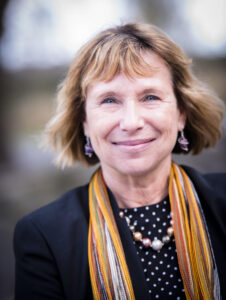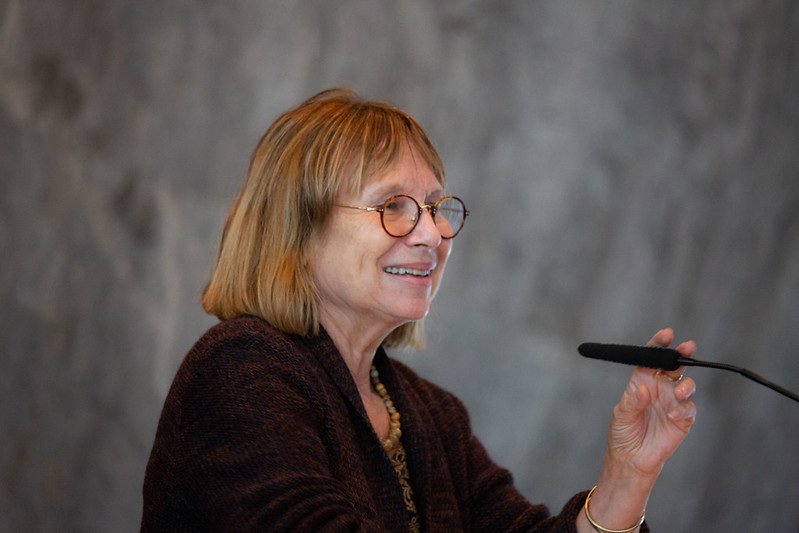- About Us
- Policy Center
- Learn
- Press Room
- Blog
- Get Involved
- Donate
- Donate to J Street Online
- Make a Gift in Someone’s Honor or Memory
- Make a Monthly Gift
- Tax-Deductible Donations
- Giving by mail

Fania Oz-Salzberger grew up on Kibbutz Hulda in the center of Israel. Her father, the celebrated writer Amos Oz, and mother Nily named her after her paternal grandmother Fania, who died by suicide in the aftermath of the Holocaust. Two of her grandparents were kibbutz founders and socialist Zionists – and one of her grandfathers was a staunch Revisionist Zionist and follower of Russian Jewish leader Ze’ev Jabotinsky.
“I think many of my choices in life were inspired by the combination of Zionism, humanism, and social democracy that informed my childhood and youth. The kibbutz also gifted me with a love of nature and with deep respect for society and solidarity,” Oz-Salzberger explains.
As we approach the 75th anniversary of the founding of the State of Israel, Fania Oz-Salzberger sat down with us to discuss her family history, her lifelong work, and how she views the current moment.
 After finishing high school, Oz-Salzberger volunteered for a year at her youth movement and went to the army, where she became an officer in the then-secret intelligence unit 8200. Years later, she married her “army sweetheart”, Eli Salzberger, today a professor of law at the University of Haifa, where they teach together.
After finishing high school, Oz-Salzberger volunteered for a year at her youth movement and went to the army, where she became an officer in the then-secret intelligence unit 8200. Years later, she married her “army sweetheart”, Eli Salzberger, today a professor of law at the University of Haifa, where they teach together.
After completing two degrees in history and philosophy at Tel Aviv University she went to Oxford, where she pursued a Ph.D. alongside her husband. “My doctoral thesis was about Scottish and German political thought in the eighteenth century,” she explains. “This may sound a bit obscure until you uncover the underlying themes, that are deeply relevant to Jews and to Israelis: What went wrong in German philosophy, that made it reject civic and liberal values? What is the power of civil society and citizen activism within the modern state?”
She sees many parallels with her studies to the fight happening on the streets of Israel now “Today, in Israel, civil society is showing enormous strength and resourcefulness in our fight against the dictatorial intentions of the ruling coalition,” Oz-Salzberger notes.
Oz-Salzberger has spent her career in academia, teaching and authoring multiple bestselling books, and traveling the world to connect with Jews across the diaspora. She says that she has been a civil ambassador for Israel as a liberal democracy throughout her life. And for the past two decades, she has also been a vocal and staunch critic of Benjamin Netanyahu’s various governments. She views the threats posed by his reign and policies as deeply intertwined with lessons we can learn from historical events.
“I am a historian. I address and interpret current affairs. This does not mean I make facile use of my scholarship for political purposes, but I do believe that history has subtle relevancy to everything we are living through today,” she says.
Oz-Salzberger notes that she is not only desperately worried about the future of Israeli democracy, but she also fears that the inner division in Israeli society may be beyond repair. “There is no civil spirit without equality or human rights. We, Israeli liberals, have awakened from several decades of slumber to realize that equality is a shambles,” she says.
 As Israeli democracy faces unprecedented threats, Oz-Salzberger often finds herself in disbelief. “To be quite frank, I think that no one – not even the plotters of our government’s attempt to undermine democracy – ever thought that Israel would be facing such an abyss at its 75th anniversary. It is a nerve-wracking dangerous moment,” she tells J Street.
As Israeli democracy faces unprecedented threats, Oz-Salzberger often finds herself in disbelief. “To be quite frank, I think that no one – not even the plotters of our government’s attempt to undermine democracy – ever thought that Israel would be facing such an abyss at its 75th anniversary. It is a nerve-wracking dangerous moment,” she tells J Street.
But she also sees many signs of hope, in the faces of those taking to the streets to voice their opposition to the Netanyahu government.
“What I’m most proud of in Israel today is those good citizens. The half million, soon to become a million, Israelis out on the streets. Our resistance is not polite, but neither is it violent or abusive. We have vowed to protect the independence of the judiciary with our bodies if need be. Any optimism for the future relies on this resistance,” she explains. “ Never before, at least not since 1948, have freedom and independence meant more to Israelis. We, who love democracy as much as we love our Jewish legacy – and, as I argue, democracy is part of our Jewish legacy – will make our voice heard clear and loud.”
She says her greatest hope is that the current crisis will relaunch two great projects that have so far failed or been neglected: a long-term peace agreement with the Palestinians, and a written constitution for Israel.
“The former is our only chance for peace and normality; the latter is our only chance for true and lasting national freedom. I call upon all friends of Israel to support us in these projects. But the responsibility is ours alone, ours and our children’s.”